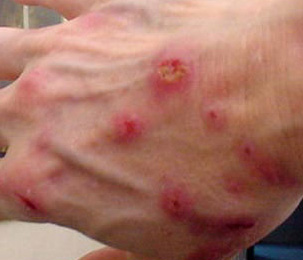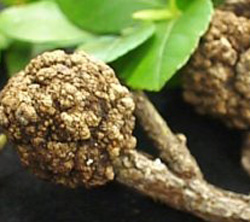- "Unlike infections, this is something much more
serious. People die from complications because the disease is more than
skin deep. It's not just a skin condition that causes lesions. It goes
into the stomach and impacts the G.I. tract and causes brain conditions..."
-
- "I have met people from all walks of life: High-powered
attorneys, physicians, nurses, actors, actresses, athletes. They go nuts
after awhile. They become socially rejected because of the way they look.
The whole thing is just a disaster."
-
- Victims Complain Of Inflammation, Lesions,
Cognitive Problems, Fatigue
-
- By Chelsea Schilling
- © 2008 WorldNetDaily
- 5-17-8
-

-
- Lesions on person suffering from Morgellons disease
-
- Scientists are debating whether a dehabilitating condition
called Morgellons disease could be caused by bacteria or fungus on plants
in California, Texas and Florida, though many agree that research is leaving
them with more questions than answers.
-
- While there are many unfounded theories about the cause
of Morgellons disease, including alien abduction and government conspiracies,
some have attempted to draw a link between the mysterious illness and genetically
modified food by suggesting engineered crops may contain bacterium responsible
for the disease.
-
- What is Morgellons disease?
-
- Dr. Vitaly Citovsky of the Morgellons Research Foundation
said the condition has many reported symptoms that have virtually stumped
scientists.
-
- "Generally, people complain of an appearance of
fibers in their skin," he told WND. "It itches. There's some
inflammation, skin lesions, and they complain that it generally affects
their well-being with fatigue similar to Lyme disease. Some people complain
of psychological conditions. We cannot define it precisely."
-
- Other commonly reported symptoms include:
-
- * Multi-colored fiber-like strands or crystals protruding
out of skin
-
- * Fatigue
-
- * A feeling of parasites or worms crawling under skin
-
- * Black specks in lesions that do not heal
-
- * Joint swelling and/or hair loss
-
- * Memory loss or general brain fog with difficulty concentrating
-
- The Morgellons Research Foundation reported that approximately
10,000 U.S. families with Morgellons symptoms registered with the organization
prior to February 2007. Of all individuals reporting, 24 percent lived
in California, and a disproportionate number resided in the San Francisco
metropolitan area.
-
-
-

-
- Magnified image of fibers from Morgellons sufferer
-
- The Centers for Disease Control and Prevention released
a Jan. 16 statement indicating that Kaiser Permanente's Northern California
Division of Research has received a $338,000 grant to to learn more about
Morgellons, an affliction it refers to as a "skin condition."
-
- However, Dr. Ahmed Kilani, president and CEO of Clongen
Laboratories and a specialist in infectious disease detection, told WND
the illness is much more than a mere skin condition.
-
- "It spreads between individuals," he said.
"Unlike infection, this is something much more serious. People die
from complications because the disease is more than skin deep. It's not
just a skin condition that causes lesions. It goes into the stomach and
impacts the G.I. tract and causes brain conditions."
-
- Link between Morgellons and genetically altered crops?
-
-

-
- Plant tumor caused by Agrobacterium
-
- Citovsky sees a connection between the mysterious Morgellons
disease fibers and a type of bacteria that causes tumors in plants, called
Agrobacterium.
-
- "Agrobacterium species are known to be found in
patients in hospital settings," Citovsky told WND. "The person
is often weakened and has some skin lesions or some other roots of infection,
and like any other bacteria, Agrobacterium can go there and just proliferate
using the skin as a medium for its growth. So, if you have a lesion, and
you work in the garden, you'll get all kinds of dirt in there and germs
among the Agrobacterium."
-
- Citovsky explained that the bacterium is present in virtually
all soil and is often used to genetically alter crops.
-
- "A year ago, we took biopsies from the skin of patients,"
he said. "We looked for the presence of genetic material of Agrobacterium
mutations. Agrobacterium is bacterium that is used also, among other things,
in genetic engineering of plants."
-
- Dr. Stanton Gelvin, a professor at Purdue University
College of Science who has studied the bacterium for nearly 30 years, said,
"Agrobacterium is the means by which DNA is transferred to the plant.
After the DNA is transferred to the plant, [genetic engineers] use antibiotics
and kill the Agrobacterium. So there's no Agrobacterium around, and now
you have a plant with new genes in it."
-
- Both Gelvin and Citovsky said there are no traces of
the bacterium in plant tissue following genetic alteration. Though many
patients have tested positive for it, they vehemently protest any suggestion
that humans can have genetically altered cells and contract Morgellons
disease by eating engineered crops treated with Agrobacterium.
-
- "That idea is total lunacy," Citovsky said.
"It has nothing to do with it. Forget this mumbo jumbo people use,
environmentalists for some unknown reason, when they are protesting against
genetically engineered plants. Those plants feed millions of people who
are hungry and dying. It has nothing to do with the disease."
-
- Bacteria or fungi?
-
-

-
- San Francisco Bay area
-
- Dr. Kilani reviewed two samples of fibers from Morgellons
patients and extracted DNA from the strands. His research indicated the
fibers could come from a fungus.
-
- "Everyone has their own theories about this, but
I don't think it's connected to Agrobacterium," he said. "I think
it's another organism that has not been described in clinical medicine.
It could be a fungus or a parasite or something more complex than bacteria."
-
- Kilani said he thinks Morgellons disease could be linked
to areas of the U.S. with swamp land and wet areas because there has been
a high prevalence of disease reports in the San Francisco Bay Area and
other places with bodies of water and high levels of humidity, such as
Texas and Florida.
-
- "There is something in the environment," Kilani
said. "It is probably linked to plants, yes. Maybe it lives on plants,
and it adapted to the human host."
-
- Citovsky, however, provided a simple explanation for
increased Morgellons disease reports in the three states.
-
- "Who knows," he said. "Maybe people complain
more there."
-
- A scientific mystery
-
- Kilani said scientists don't have the support to investigate
Morgellons disease because they are short on funds and resources.
-
- "Nobody thinks it's a disease, so that is part of
the problem. Until they do, it's going to continue spreading. It's in households,
so when one individual is infected, we find out that the rest of the household
is infected."
-
-

-
- Fibers removed from facial lesion of 3-year-old
boy
-
- Though many people, even members of the medical science
community, do not believe Morgellons is a legitimate disease, Kilani said
he receives as many as 10 calls every day from people who identify themselves
as having the symptoms. He refuses to accept the notion that it is a fabricated
illness.
-
- "No, this can't be," he said. "Not almost
a half-million patients, no. I have met people from all walks of life:
High-powered attorneys, physicians, nurses, actors, actresses, athletes.
They go nuts after awhile. They become socially rejected because of the
way they look. The whole thing is just a disaster."
-
- Kilani said Kaiser Permanente is the first and only recipient
of funding for Morgellons research from the CDC, but he doesn't think the
grant will be enough to help scientists determine if Morgellons disease
is caused by bacteria, fungi or any other environmental factor.
-
- "I'm not sure how far that will go because $338,000
is a drop in the bucket," he said. It'll be spent in a week. It's
just not enough money. Whoever gets funding and can investigate this problem
is going to make a huge contribution because there are lots of people with
this illness."
-
-
- http://worldnetdaily.com/index.php?fa=PAGE.view&pageId=64266
|




